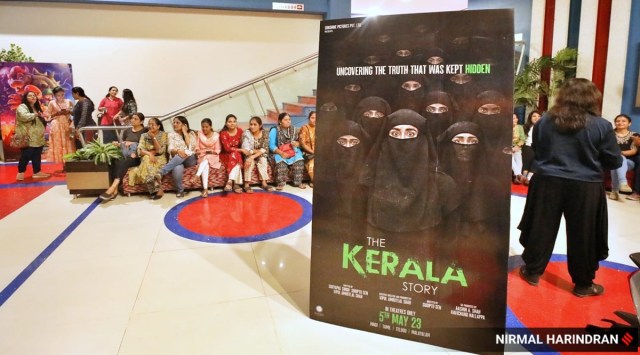
On the opening day of The Kerala Story, as I stepped out of the movie theatre after watching the film, my cousin called me. She casually mentioned her outing with her domestic worker, Vijayamma, in Kollam, Kerala. The 70-year-old worker, a staunch Hindu — she reads the Bhagavad Gita at a temple — stopped by a church and prayed with folded hands, chanting “Narayana Narayana” (Lord Vishnu). My cousin talked about how moved she was.
Back in Noida, I had just gotten home having watched The Kerala Story. It was as insidious as I had feared. The Prime Minister of India has hailed it as a film that “exposes terror conspiracies” at an election rally in Karnataka. An average Malayali, Hindu, Muslim or Catholic — will find several parts of the movie laughable.
As a reviewer put it, some scenes were straight out of a tourism brochure, one completely out of touch with the real Kerala. The protagonist, in a scene with a Kathakali performer, suddenly becomes an actor from the North on a tour of Kerala!
The makers claim the movie is based on true stories. But the experience of a handful of people from the state is portrayed as a well-rounded story of Kerala, proclaiming that the state is a “ticking time-bomb”. They depict a Kerala that outsiders alone can imagine; not those who grew up there.
Muslim men in Kerala are not out to destroy the lives of Hindu women. They are ordinary people who run businesses, work in government offices, study in universities as any other student, trying to make a living. Yet the uncensored bloodshed seems to be depicted with the sole intention of creating fear about a certain community.
The story of a bunch of misguided youth choosing terrorism can be from any state.
The makers seem to have missed other real-life stories from Kerala — ones that Malayalis hold close to their hearts. Malayalam cinema still stands out amid the riot of confusing unrealistic movies today because it stays close to life, people and their emotions. It has depicted beautiful relationships between people from different religions and castes, without hurting any.
The story of Kanchanamala, a Hindu woman who loved a Muslim man, Moideen, was made into a film Ennu Ninte Moideen. They had only one mission — a life together. In her 80s, Kanchanamala still lives the life of his widow after the man drowned in a river in Mukkam, Kozhikode.
Ennu Swantham Sreedharan is the true story of a Muslim woman who raises three children of her Hindu domestic worker and friend Chakki after her untimely death. The couple — Thennadan Subaida and Abdul Aziz Haji — are no more. But Sreedharan narrated their heartwarming story on social media that led to the making of the film. He revealed how the couple never tried to convert the three kids to Islam but raised them with their own children.
In the national award winning film Thanichalla Njan, Razia Beevi, a Muslim woman takes home an elderly Brahmin woman, Chellamma Antharjanam, who was sitting on a railway track to kill herself, and takes care of her as own mother. Again, a true story that happened in Kerala.
When politics blurs our vision, it turns into a dangerous game that erases several true stories. Its gravity challenges that of a black hole, sucking in gullible people. Amid all this, let the tribe of Vijayamma thrive.
Yamini.nair@expressindia.com
This article has been updated as the previous version had inaccuracies